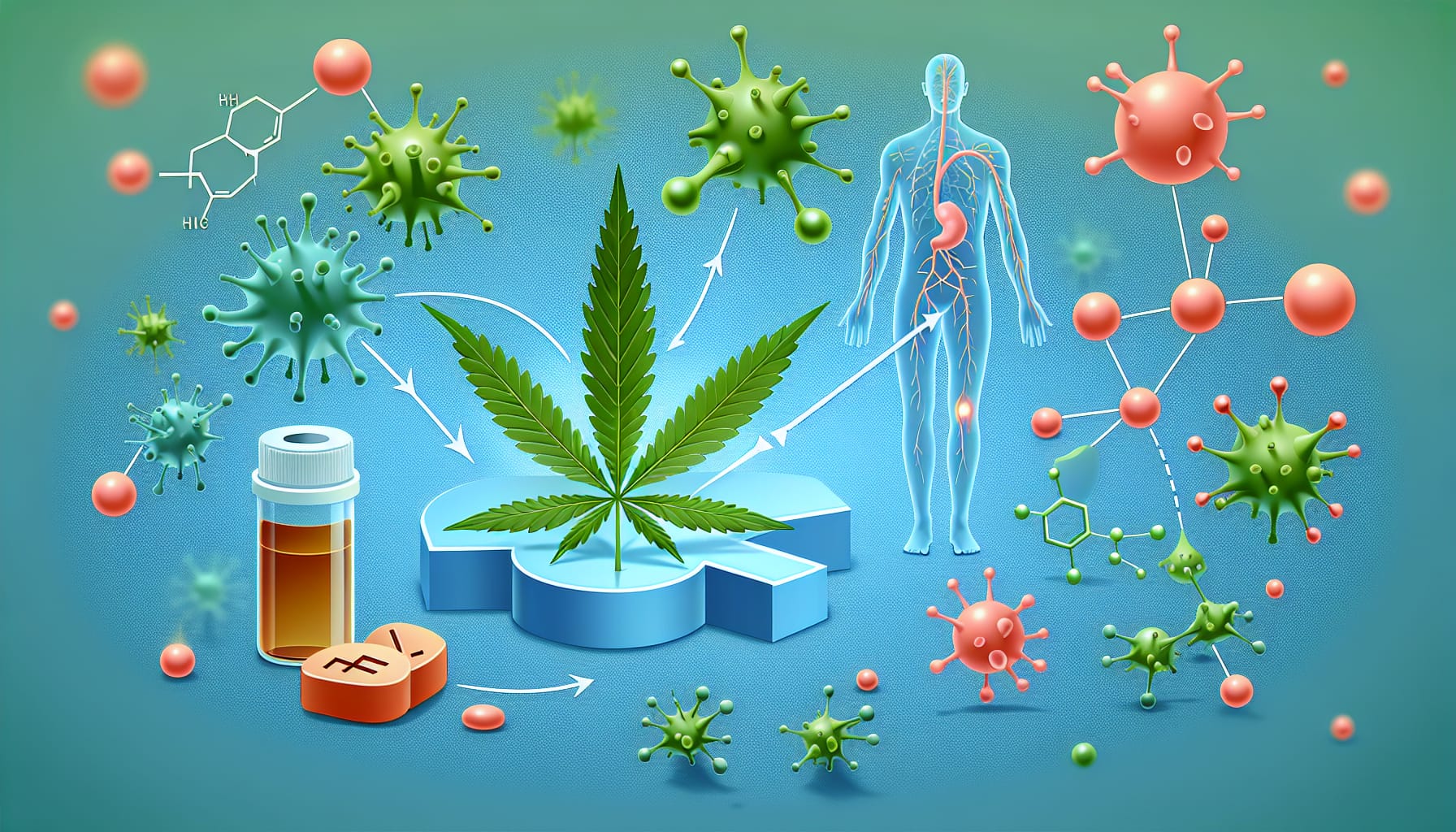You’ve probably heard about cannabis being used for various medical purposes, but have you ever wondered about its anti-inflammatory properties? In this article, we will explore the potential of cannabis in reducing inflammation and how it could potentially revolutionize the field of medicine. So, get ready to discover the intriguing world of cannabis and its potential as a powerful anti-inflammatory agent.

Overview of Cannabis
Introduction to cannabis
Cannabis, also known as marijuana, is a plant that has been used for various purposes throughout history. It has gained popularity in recent years for its potential therapeutic properties, particularly in relation to inflammation. Cannabis contains a wide range of chemical compounds, including cannabinoids, that interact with the body’s endocannabinoid system.
Components of cannabis
One of the key components of cannabis is cannabinoids. These are chemical compounds that are unique to the cannabis plant and have been found to have various effects on the body. The two most well-known cannabinoids are Tetrahydrocannabinol (THC) and Cannabidiol (CBD). THC is responsible for the psychoactive effects of cannabis, while CBD is non-psychoactive.
In addition to cannabinoids, cannabis also contains other active compounds such as terpenes and flavonoids. These compounds contribute to the overall therapeutic effects of cannabis and may interact synergistically with cannabinoids.
Methods of cannabis consumption
There are several methods of consuming cannabis, each with its own advantages and disadvantages. Smoking and vaporizing involve inhaling the smoke or vapor produced by heating cannabis flowers or concentrates. This method provides quick onset of effects but may have negative respiratory side effects.
Oral consumption involves ingesting cannabis, usually in the form of edibles, tinctures, or capsules. This method has a slower onset of effects but provides longer-lasting relief. Topical application of cannabis, such as creams or lotions, allows for targeted relief of inflammation in specific areas of the body.
Inflammation and its Effects
Understanding inflammation
Inflammation is a natural response of the body’s immune system to injury or irritation. It involves the release of various chemicals and immune cells to the affected area, resulting in redness, swelling, heat, and pain. Acute inflammation is a necessary process for healing, but chronic inflammation can have detrimental effects on health.
Common causes of inflammation
Inflammation can be triggered by a variety of factors, including infections, injuries, autoimmune disorders, and prolonged exposure to certain substances or environmental conditions. Poor lifestyle choices, such as a high-sugar diet or lack of exercise, can also contribute to chronic inflammation.
Impact of chronic inflammation on health
Chronic inflammation has been linked to the development and progression of numerous health conditions, including cardiovascular disease, arthritis, diabetes, Alzheimer’s disease, and certain types of cancer. It can also exacerbate symptoms of existing conditions, leading to increased pain and reduced quality of life.
Cannabinoids and Inflammatory Response
Role of cannabinoids in the body
Cannabinoids interact with the body’s endocannabinoid system, which plays a crucial role in maintaining homeostasis and regulating various physiological processes. The endocannabinoid system consists of cannabinoid receptors (CB1 and CB2), endocannabinoids produced by the body, and enzymes involved in their synthesis and breakdown.
When cannabinoids from cannabis are consumed, they can bind to these receptors and modulate the immune response, including the inflammatory process.
Interaction between cannabinoids and the immune system
Cannabinoids have been shown to influence the immune response by regulating the production and release of inflammatory mediators. They can reduce the production of pro-inflammatory substances and increase the production of anti-inflammatory substances, leading to a balanced immune response.
Additionally, cannabinoids can interact with immune cells, such as T cells and macrophages, to modulate their function and suppress excessive inflammation.
Effects of cannabinoids on inflammation
Studies have demonstrated that certain cannabinoids, particularly CBD and THC, possess anti-inflammatory properties. They can inhibit the release of pro-inflammatory cytokines, reduce the activation of immune cells, and lessen the recruitment of immune cells to the site of inflammation.
Furthermore, cannabinoids may also exert antioxidant and neuroprotective effects, which can contribute to their anti-inflammatory actions.
Cannabidiol (CBD) and Inflammation
Introduction to CBD
CBD is a non-psychoactive cannabinoid found in cannabis that has gained significant attention for its potential therapeutic applications. It has been studied for its anti-inflammatory properties and its ability to alleviate pain, reduce anxiety, and improve sleep.
Mechanisms of CBD’s anti-inflammatory effects
CBD has been found to act through various mechanisms to exert its anti-inflammatory effects. It can inhibit the production of pro-inflammatory cytokines and chemokines, modulate the function of immune cells, and reduce the permeability of blood vessels, thereby reducing the infiltration of immune cells into the site of inflammation.
Furthermore, CBD can interact with non-cannabinoid receptors, such as the TRPV1 receptor, which plays a role in pain perception and inflammation.
Research studies on CBD and inflammation
Numerous preclinical and clinical studies have investigated the effects of CBD on inflammation. These studies have shown promising results, with CBD demonstrating potential in reducing inflammation in various conditions, including arthritis, inflammatory bowel disease, multiple sclerosis, and asthma.
However, further research is still needed to fully understand the mechanisms underlying CBD’s anti-inflammatory effects and its potential clinical applications.

Tetrahydrocannabinol (THC) and Inflammation
Introduction to THC
THC is the primary psychoactive component of cannabis and is responsible for the “high” or euphoric effects commonly associated with marijuana use. While THC is known for its psychoactive properties, it also possesses several therapeutic qualities, including anti-inflammatory effects.
Effects of THC on the immune system
THC has been found to modulate the immune response by interacting with cannabinoid receptors in the immune cells. It can reduce the activation of immune cells and limit the production of pro-inflammatory substances.
Furthermore, THC can also affect cytokine production, leading to a shift from a pro-inflammatory to an anti-inflammatory immune profile.
THC’s anti-inflammatory properties
Studies have shown that THC can effectively reduce inflammation in various experimental models. It can suppress the release of pro-inflammatory cytokines, inhibit the activation of immune cells, and decrease the expression of inflammatory mediators.
In addition to its direct anti-inflammatory effects, THC may also possess analgesic and anti-nociceptive properties, which can contribute to its ability to alleviate pain associated with inflammation.
Other Cannabinoids and Inflammation
Overview of other cannabinoids
In addition to THC and CBD, cannabis contains numerous other cannabinoids that may have anti-inflammatory properties. Some of these cannabinoids include cannabigerol (CBG), cannabidivarin (CBDV), and cannabichromene (CBC). Each cannabinoid has its own unique chemical structure and potential therapeutic effects.
Unique anti-inflammatory properties of different cannabinoids
Research on the anti-inflammatory properties of other cannabinoids is still limited, but preliminary studies suggest that they may have distinct mechanisms of action and effects on inflammation. For example, CBG has been found to inhibit the release of inflammatory markers, while CBDV has shown potential in reducing intestinal inflammation.
Further research is needed to determine the specific anti-inflammatory properties of each cannabinoid and their potential synergistic effects when combined with other cannabinoids.
Synergistic effects of different cannabinoids
Cannabinoids have been found to exhibit synergistic effects when used together. This is known as the entourage effect, where the combined action of multiple cannabinoids, terpenes, and other compounds in cannabis enhances their overall therapeutic effects.
By combining different cannabinoids with complementary anti-inflammatory properties, it may be possible to achieve a more potent and targeted anti-inflammatory response.

Methods of Cannabis Administration for Inflammation
Smoking and vaporizing
Smoking and vaporizing cannabis involve heating the plant material or concentrates to release the cannabinoids and inhaling the resulting smoke or vapor. This method provides quick onset of effects but may have negative respiratory side effects, particularly with smoking.
Oral consumption (edibles, tinctures, capsules)
Oral consumption of cannabis involves ingesting it through various forms, such as edibles, tinctures, or capsules. Edibles provide a convenient and discreet method of consumption, while tinctures and capsules allow for more precise dosing. Oral consumption has a slower onset of effects but provides longer-lasting relief.
Topical application (creams, lotions)
Topical application of cannabis involves applying creams, lotions, or ointments directly to the skin. This method allows for targeted relief of inflammation in specific areas of the body. It does not produce psychoactive effects and is a suitable option for individuals who do not wish to consume cannabis orally or inhale it.
Safety and Side Effects of Cannabis
Potential risks and contraindications
While cannabis has shown promise in its potential for treating inflammation, it is important to consider the potential risks and contraindications associated with its use. Cannabis use may not be suitable for everyone, particularly individuals with a history of substance abuse, mental health disorders, or certain medical conditions.
Adverse effects of cannabis use
Common adverse effects of cannabis use include dry mouth, increased heart rate, impaired coordination, and cognitive impairment. These effects may vary depending on the strain, dosage, and method of consumption. It is important to start with low doses and monitor your body’s response to avoid any unwanted side effects.
Drug interactions and precautions
Cannabis, particularly THC, can interact with certain medications, including blood thinners, antidepressants, and antipsychotics. It is important to consult with a healthcare professional before using cannabis, especially if you are taking any prescription medications.
Additionally, pregnant or breastfeeding individuals should exercise caution and avoid cannabis use due to its potential effects on the developing fetus or infant.

Clinical Applications of Cannabis for Inflammation
Conditions that benefit from cannabis anti-inflammatory properties
Cannabis has shown potential in alleviating inflammation associated with various conditions, including arthritis, multiple sclerosis, inflammatory bowel disease, and chronic pain. It may help reduce pain, improve mobility, and enhance overall quality of life for individuals with these conditions.
Studies on cannabis as a treatment for inflammation-related disorders
Numerous preclinical and clinical studies have explored the use of cannabis as a treatment for inflammation-related disorders. These studies have demonstrated the potential of cannabis in reducing inflammation and its associated symptoms. However, more research is needed to validate these findings and establish standardized treatment protocols.
Current limitations and future research directions
Despite the promising evidence, the use of cannabis as a treatment for inflammation still faces several limitations. The lack of standardized dosing, variability of cannabis strains, and limited research on long-term effects are some of the challenges that need to be addressed.
Future research should focus on conducting well-designed clinical trials to further investigate the efficacy, safety, and optimal dosing of cannabis for different inflammatory conditions. Additionally, exploring the potential of specific cannabinoids or combinations of cannabinoids and other compounds in cannabis may provide further insights into their anti-inflammatory properties.
Legality and Regulatory Considerations
Legal status of cannabis globally
The legal status of cannabis varies widely around the world. While some countries have legalized cannabis for both medicinal and recreational use, others have strict regulations or complete prohibition. It is important to be familiar with the laws and regulations regarding cannabis use in your jurisdiction.
Medical cannabis programs and regulations
Many countries and jurisdictions have established medical cannabis programs that allow for the legal access to cannabis for medicinal purposes. These programs often require patients to obtain a prescription or recommendation from a healthcare professional and may have specific regulations regarding the purchase, possession, and consumption of cannabis.
Challenges and progress in cannabis legalization
The legalization of cannabis has been a topic of debate and controversy for many years. However, there has been a growing acceptance and recognition of its potential therapeutic benefits, including its anti-inflammatory properties.
While progress has been made in terms of cannabis legalization, challenges still exist, including stigma, regulatory hurdles, and the need for more comprehensive research. Continued education, advocacy, and evidence-based policies will be essential in shaping the future of cannabis legalization and access.

